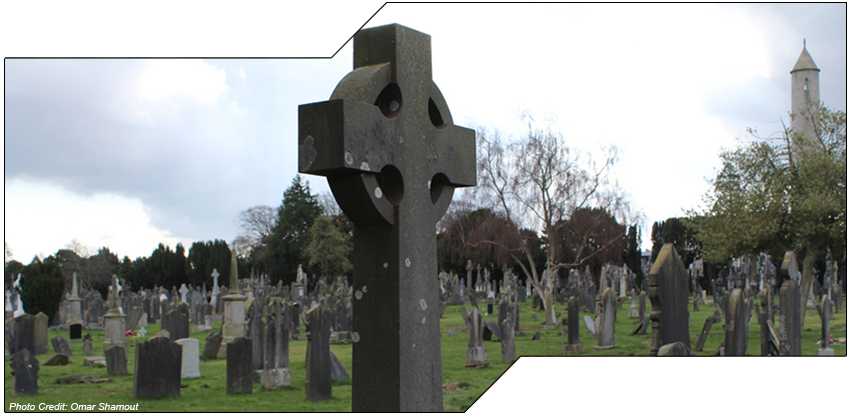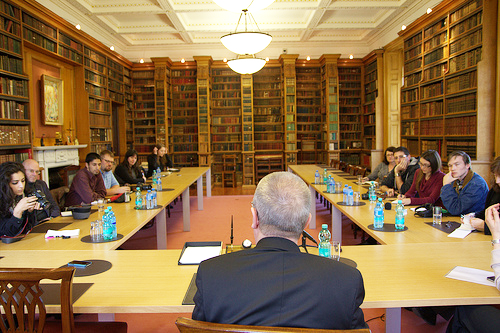

 Timing is everything and ours was very, very good. As our flight from LAX to Dublin prepared for takeoff, the big news broke. White smoke: a new pope. How would the election of the first Argentinian pope play out in what was once called the world’s most Catholic country? Ireland, whose increasingly secularized society has been characterized as post-Catholic, would be a good place to investigate the impact of secularization, the future of the Church, and national identity in a country once unified by faith.
Timing is everything and ours was very, very good. As our flight from LAX to Dublin prepared for takeoff, the big news broke. White smoke: a new pope. How would the election of the first Argentinian pope play out in what was once called the world’s most Catholic country? Ireland, whose increasingly secularized society has been characterized as post-Catholic, would be a good place to investigate the impact of secularization, the future of the Church, and national identity in a country once unified by faith.
During the two months before our March departure for Dublin and Belfast, the students and instructors of J-585, Reporting on Religion, delved into Irish history and Roman Catholicism. Studying this very small island, we discovered a rich and complex past. We struggled to understand the conflicts that splintered into religious, ethnic, and class divides, and we met with experts who helped us parse the particularities of the island’s Catholic heritage. Honing book knowledge through local reporting, students covered Los Angeles’ Catholic communities. A swell of Church-related headlines --sex abuse, immigration debates, Pope Benedict’s resignation—shaped and strengthened their stories.
#Irish585 Reporter’s Notebook
When we learned that a new pope had been elected—a faster outcome than we’d expected—we yelled over seats and blocked the airplane’s aisle to strategize our coverage. Assuming the conclave would make a decision while we were in Dublin, students knew where to find immigrant enclaves, traditionalist strongholds and avid reformers. Now instead of beginning the visit with a bus trip around town, they’d dropped off their bags, grabbed hats and gloves, and hit the ground running.
 We joined Dublin’s crowd of tourists on the Thursday before the St. Patrick’s Day. Cold yet sunny after weeks of rain, the change in weather reassured visitors they’d made the right decision to spend a weekend snockered in silly green hats and face paint. Like the locals, few thought the new pope would make much difference. Most wished him well but doubted the Church would fundamentally change. Some shrugged, others held onto hope, still others were past caring. Hours later with stories filed, we repaired to a local restaurant to celebrate a successful arrival and an exhilarating day.
We joined Dublin’s crowd of tourists on the Thursday before the St. Patrick’s Day. Cold yet sunny after weeks of rain, the change in weather reassured visitors they’d made the right decision to spend a weekend snockered in silly green hats and face paint. Like the locals, few thought the new pope would make much difference. Most wished him well but doubted the Church would fundamentally change. Some shrugged, others held onto hope, still others were past caring. Hours later with stories filed, we repaired to a local restaurant to celebrate a successful arrival and an exhilarating day.
On Friday morning, we walked from St. Stephen’s Green past Trinity College, and across the river. We met Father Sean McDonagh at an old hotel where a lunch crowd of pastel ladies and vested men waited on line for fresh carved ham and boiled potatoes. McDonagh came of age in the 1960s. He’d been an organizer, a peacemaker and, of late, an environmental activist.
and across the river. We met Father Sean McDonagh at an old hotel where a lunch crowd of pastel ladies and vested men waited on line for fresh carved ham and boiled potatoes. McDonagh came of age in the 1960s. He’d been an organizer, a peacemaker and, of late, an environmental activist. We’d be the last generation, he warned, to enjoy honey, cocoa and bananas. Two years ago, McDonagh announced a gathering for priests desirous of church reform. Four hundred came to the first meeting. Today the Association of Catholic Priests has 2,000 members in Ireland who support broad-based reform including a democratic church, empowered laity, and married and female priests
We’d be the last generation, he warned, to enjoy honey, cocoa and bananas. Two years ago, McDonagh announced a gathering for priests desirous of church reform. Four hundred came to the first meeting. Today the Association of Catholic Priests has 2,000 members in Ireland who support broad-based reform including a democratic church, empowered laity, and married and female priests
That afternoon, we visited the archbishop’s residence, a palatial stone building surrounded by green lawns. Archbishop Diarmuid Martin became a hero to victims of clergy sexual abuse when he named a task force to investigate local cover-ups and subsequently decried perpetrators and their enablers. Addressing our questions about issues facing the Ireland’s churches, Martin was cautiously hopeful about the new pope’s prospects and Catholicism’s future.
Saturday was cold, but the weather mattered little to the young crowds that packed Dublin’s streets. Students pursued their stories and spent part of the morning listening to Brendan Butler, co-chair of We Are Church. Sixteen years ago, Butler and other reform-minded laity began discussing how they might nudge the Vatican on issues including the ordination of women, inclusion of divorced people and its teaching on homosexuality and contraception. Today We Are Church has several hundred members who, despite the lack of progress, continue calling for change.
Sixteen years ago, Butler and other reform-minded laity began discussing how they might nudge the Vatican on issues including the ordination of women, inclusion of divorced people and its teaching on homosexuality and contraception. Today We Are Church has several hundred members who, despite the lack of progress, continue calling for change.
St. Patrick’s Day. Sunday March 17, found us at Mass at St. Mary’s Pro-Cathedral. The service was in Irish, with only a short homily in English. The Archbishop was in attendance as was Michael Higgins, Ireland’s president. Though Martin had told us that Masses in Dublin often were sparsely attended, the 11 a.m. liturgy was packed. (The woman sitting next to me opined it was all tourists). Afterwards, the icy rains did little to quell the pleasure of revelers watching the St. Paddy’s Day parade. Festivities lasted through the night as small gangs of green-swathed merrymakers queued up for pubs or drank in the streets.
Though Martin had told us that Masses in Dublin often were sparsely attended, the 11 a.m. liturgy was packed. (The woman sitting next to me opined it was all tourists). Afterwards, the icy rains did little to quell the pleasure of revelers watching the St. Paddy’s Day parade. Festivities lasted through the night as small gangs of green-swathed merrymakers queued up for pubs or drank in the streets.
A bank holiday, Monday marked our departure for Belfast. On the way we stopped at Newgrange, a burial mound predating the pyramids. Archeologists believe the site, which appears to mark the winter solstice, had spiritual, ceremonial and astrological significance for the people who built it. We reached Northern Ireland’s capital city by nightfall, ready to explore the legacy of the Troubles.
Archeologists believe the site, which appears to mark the winter solstice, had spiritual, ceremonial and astrological significance for the people who built it. We reached Northern Ireland’s capital city by nightfall, ready to explore the legacy of the Troubles.
Our morning orientation tour took us through the heart of the city and onto the Peace Wall and Belfast murals. After seeing once-embattled neighborhoods, students scattered to report on their stories. Later, several of us reconvened at Stormont, Northern Ireland’s Parliament, for a session on local human rights issues and a meeting with an Amnesty International representative. That night—as we’d done in Dublin, we repaired to pubs for Guinness, whiskey and local music.
Later, several of us reconvened at Stormont, Northern Ireland’s Parliament, for a session on local human rights issues and a meeting with an Amnesty International representative. That night—as we’d done in Dublin, we repaired to pubs for Guinness, whiskey and local music.
On Thursday, a small group returned to North Belfast. We visited 174 Trust, a non-denominational Christian project that works for reconciliation and community building between Catholics and Protestants. That evening, we swapped stories with William Crawley, a veteran BBC journalist renowned for his religion coverage. Still later, the snow started and by morning Belfast’s streets were bright white. Intrepid Angelenos (what do we know about snow?), we set out for our last day’s interviews. Some of us went to see Gavin Robinson, Lord Mayor of Belfast, and others went to meet Caral Ni Chuillin, a Sinn Fein member who is Minister of Culture, Arts and Leisure. Unlike us, however, Ni Chuillin did not brave the snow, and our attempts to reach her were frustrated. Hunkered in our bed-and-breakfast’s roomy dining room on that last, very cold night, we ordered out for pizza and, what else, worked on our stories. The next morning, we boarded a bus back to Dublin’s international airport.
The next morning, we boarded a bus back to Dublin’s international airport.
J585’s stories received excellent play. Many of the pope-related pieces appeared on GlobalPost’s Belief blog or as part of its Special Report on the Global Church. Other articles appeared in the Los Angeles Times, Washington Post, KPCC website and the Atlantic among other outlets.
-- Diane Winston
Published Work



